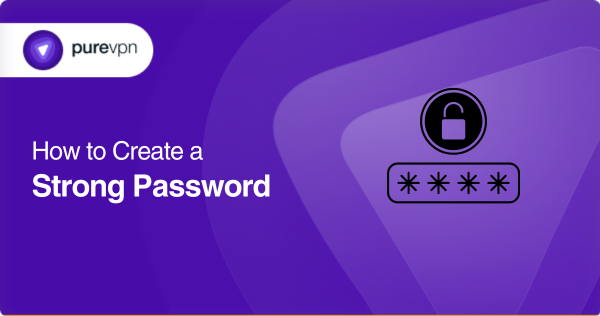Table of Contents
If you are struggling to create a good strong password, know that you are not alone, but definitely among a few! Most people opt for easy-to-remember passwords that are just as easy to hack, and that is where the major problem with data security lies.
If you want to protect your data against cyber criminals and their vicious attacks, create a strong password that is unique, complex, and difficult to hack!
This guide will teach you how to create an unbreakable password to safeguard your information from malicious attacks.
You will also learn about the importance of password management and the best practices for keeping your passwords secure. Read on!

What makes a strong password – key factors
Some factors differentiate a strong password from one that is easily crackable using an algorithm. Here are some characteristics that make a password strong:
At least 12 Characters long
The longer the password, the less chance your system will get hacked! A good strong password is generally 12 (or even 15!) characters or longer. Hackers try different combinations to hack a password, so each character considerably adds to a password’s strength.
Simple is a big NO
A simple password is not our target when developing some good options. According to a survey, a considerable percentage of people use a password as their password, and while it is nice to have a key you can easily remember, you should draw a line somewhere.
Avoid repeating patterns
Simply put, strong passwords do not contain repeated strings like 3333, 12345, or generic keyboard patterns (i.e., qwerty).
Complex passwords are special
Complexity is an important trait of a strong password. A password like %j2%^$E^%$kr^Zfp5%^# would be more difficult to hack than something like qwerty, and the reason is clear. Since the former is more complex, it will take hackers significantly more time if they try to break your code
Uniqueness is key
Your password must be unique and not repeated across different accounts, as it reduces the risk of a data breach across multiple platforms. Because it lacks uniqueness, a generic password is much more hackable than a unique password.
No birthdays or pets
The basic rule to get a strong password is to include no personal information. Personal information like birth dates, hometowns, or pet names make a password predictable and can compromise a good portion of your password, if not all.
Strong passwords are random
If a password is random, it is unpredictable, which makes it less likely to get hacked. Randomness is also crucial if you want a good password.
Tips to create a strong password
Cybercriminals are well aware that many people put little effort into creating passwords that are supposed to safeguard their valuable data. As a result, it is easy for hackers to use common attacks to crack passwords and gain access to sensitive information.
It is crucial to take password security seriously to avoid such attacks. Fortunately, there are several foolproof tricks you can use to create a strong password that will keep your information safe from cybercriminals:
Use passphrases instead of words
Brute force attack, dictionary attack, or even simple guesswork fails when you use a long sentence as a password. The key here is to create a phrase with completely unrelated and random words, making it extremely hard to guess or break.
A passphrase like Dragon pencil star sunset could give you DrPeStSu, or a more complex option like nO6&lI4%rA2!tE&.
Use Emoticons
Using emoticons can help you considerably strengthen your password because they are not commonly used in password sequences. These character combinations should be added randomly once or twice between your passwords to improve the complexity and remove any guesswork.
Use both cases
Many popular online platforms use case-sensitive passwords for added security, and you can use this factor as an advantage. When trying to create a strong password, you can employ both upper and lowercase letters to increase its randomness and complexity.
Using both cases doubles the number of alphabets to 52, significantly increasing the possible combinations a hacker will have to try out for a brute force or dictionary attack.
Try password generators
A reliable password generator is an effective way to create a really strong password that could deflect a cyber attack.
These password generators use efficient algorithms to help you create passwords with custom requirements such as character length, complexity level, etc. Hence using a tool like this can help you save your time and effort.
Use quotes
Using long random phrases and quotes from books, movies, etc., is a common way people create a strong password because such quotes are hard to guess or recreate.
However, using the said quote (by itself) will not be enough! Therefore, you should always add special characters or numbers between alphabets, rearrange words, etc.
Mix character types
If you plan to use a character, why do one when you can use them all? It is always better to utilize a mix of characters, including numbers, alphabets (both in upper and lower cases), and special characters, altogether than using them one by one.
Use password managers
Password managers provide a convenient and secure way for users to keep track of all their security keys effectively. Such applications help create and store all said complex passwords in an encrypted form in a single database from where they are retrieved and filled automatically for a user.
You must remember a master password to log into your password manager, along with two-step verifications for added security.
Change passwords frequently
Changing passwords every 6-12 months can help you stay ahead of the curve and strengthen your cybersecurity against hackers. But ensure your passwords do not get simpler over time, as it might compromise your system.
How can a password get hacked
It is likely already compromised if you have been using the same password for a while across different platforms. Cybercriminals or hackers tend to attain such credentials from users on various platforms and sell this information to malicious websites.
These vicious cyber criminals use different types of attacks to crack your code. Here are a few of them:
The Bruteforce attack
It is one of the most common attacks to hack a password. The brute force attack implies that the hacker runs a program that goes through every possible combination of certain characters till they break into your system.
It is easy to manage using software specifically programmed for this task, as simple passwords take only seconds or minutes to break.
Counter-attack: You can protect your system against such an attack using a password that is longer than 12 characters.
The Dictionary attack
If your passwords use common words, chances are you will fall victim to dictionary attacks. Such attacks use common patterns and words from a dictionary to hack a security key hence passwords like 12345, qwerty, or abc123 are highly discouraged.
Counter-attack: Passphrases can help you deflect a dictionary attack as they string together pieces of random words with special characters which will not be found in those dictionaries.
The phishing attack
Phishing attacks are quite common and are mostly conducted over email. The criminal poses as a trusted source and asks users to log into a site built to mimic its trusted counterpart. But as the user is unaware, their login credentials are stolen to be sold over malicious websites later.
Counter-attack: Remain cautious of emails, messages, and phone calls that ask for personal information, as it is often not part of any platform’s policy.
How to protect your password from getting hacked
Now that you know how to create a strong password, it is important to understand how to protect your password from falling into the wrong hands.
Multiple security practices can be used to protect your password, like using a password manager, a VPN, etc. Here are a few:
Use a VPN
A reliable VPN is a foolproof way to improve network security and protect your data against prying eyes. A virtual private network or VPN encrypts your traffic and passes it through a secure network tunnel preventing cyber criminals from intercepting sensitive information like your password.
It is important to use a reliable VPN like PureVPN that can guarantee complete network security using thousands of remote servers so you can stay protected everywhere.
Use two-factor authentication
If two-factor authentication is in place, a hacker cannot hack a system even if the password is compromised. That is because two-factor authentication uses an OTP code or pin plus your general password to access a system.
Don’t share your password
As simple as this phrase is, multiple people have compromised their passwords because they simply shared their passwords over texts or emails.
It is important to understand that you should never, under any circumstance, share your sensitive passwords with any person, representative, friend, etc., as it increases the risk of a data breach.
Use a password manager
As discussed before, password managers are effective tools for maintaining your passwords. A password manager does all the work for you by encrypting, storing, filling, and managing all your passwords in one space.
Change your passwords regularly
Changing your password is also a good practice and helps to keep your password out of the hands of these cybercriminals. That is because even if your information was compromised in the past, the password will no longer work!
6-12 months is perfect for a change, but ensure that your new password is as strong as your previous one.
No logging in using Google or Facebook
Logging into platforms using your existing accounts is often discouraged because it will also compromise your information on this new platform if your account is hacked.
Don’t save passwords on your devices
While you will find it easier to write your password down in your notepad app to help you remember, it is not a good practice. Cyber security experts always recommend you use a password manager instead of just storing your passwords in any random application on your phone or computer.
Do not reuse passwords
Uniqueness is crucial for a strong password, so reusing your passwords across different platforms is a big no! If you are adamant about using the same password for all your accounts, you might compromise them all, even if one gets hacked.
A reminder to our security: World Password Day
World Password Day is a reminder to us all of the importance of keeping our online accounts secure. Every year, cybercriminals are becoming more advanced and constantly looking for new ways to exploit weak passwords. Creating strong passwords that are not easy to guess or hack is vital.
On this World Password Day, let’s pledge to prioritize the security of our online accounts. Remember, creating strong passwords is just the first step. Let’s pledge to prioritize cybersecurity and stay vigilant in protecting our online accounts.
Conclusion
All in all, creating a strong password is simple as long as you follow the guideline presented in this guide. Now that you understand why using a unique complex password is essential, it is time to implement these tips and tricks to prevent compromising your accounts.
So while hackers are on top of their game, it is only fitting to gear up to protect your data against such cyber criminals.
Frequently Asked Questions
“nO6&lI4%rA2!tE&” is a good example of a strong password because it uses a passphrase with random special characters.
Some tips include creating a long unique password of more than 12 characters, with random special characters, numbers, and alphabets in upper and lower cases.
A brute force attack is where a hacker creates all possible combinations of a set of characters using software to replicate and hack a password.
Changing your password after about 6-12 months is better so that even if your security key is compromised, the previous password will be useless.



